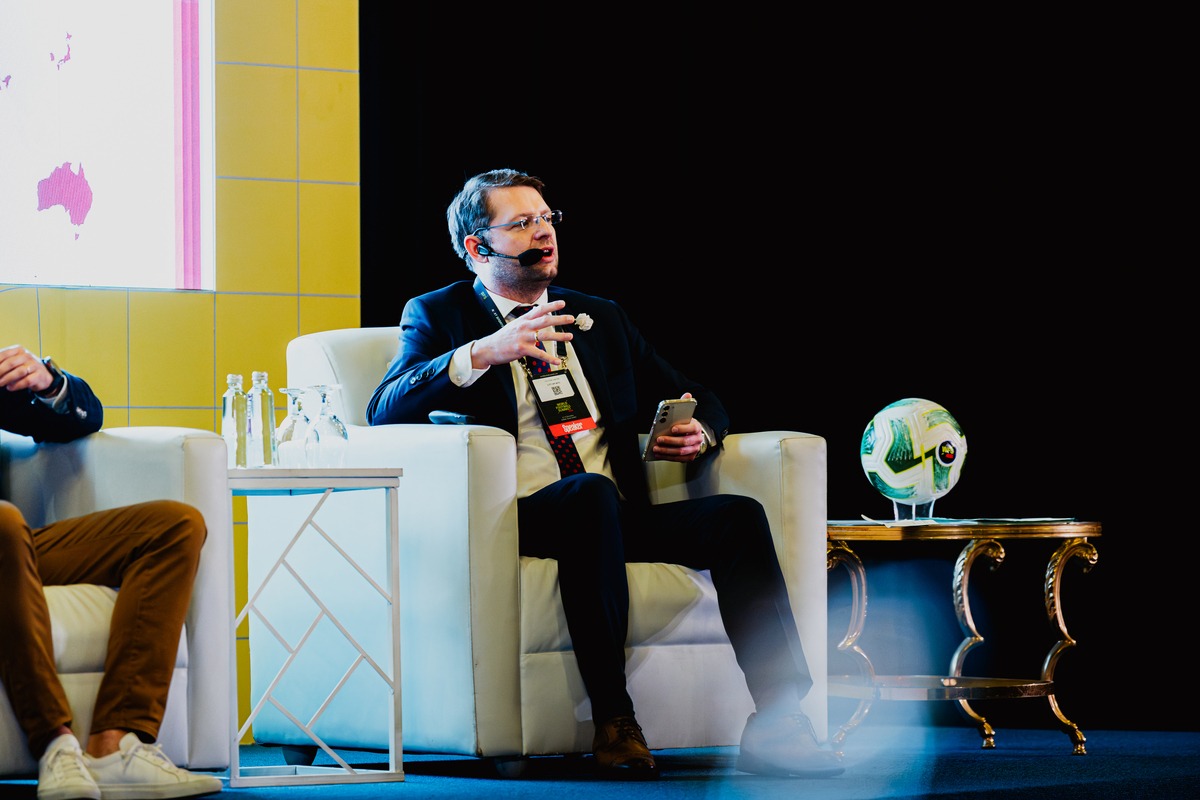While football, the sport, has an undisputed presence worldwide as one of the planet’s favorite; football, the industry, is just now expanding beyond the borders of Europe, where it has been confined for the past decades
Honey Thaljieh grew up in Bethlehem, Palestine, playing on its streets a sport that was reserved for men, in a country that presented her with every possible obstacle, from gender politics to shortages and bombigs. Still, however, she persevered. “I transformed myself from those streets, to the world stages of FIFA and beyond”, she told the public of the 2023 edition of World Football Summit Asia.
Thaljieh’s “beyond” meant becoming the co-founder and first captain of the Palestinian national football team, the first woman in the Middle East to obtain a FIFA Master and to be employed by FIFA, for whom she is Communications Manager for Special Projects, and, a member of the Palestinian High Council for Youth and Sport. Now, she wants to transform the world just as she transformed herself. And, thanks to both her experience and her position in FIFA, she already has an idea of how football is going to shape up.
HONEY THALJIEH’S VISION FOR THE FUTURE
“There are three important points that are key to our vision of the future of football”, she explained during WFS Asia 2023. “First, the globalization of football, and giving true opportunities through its democratization. Then, the understanding of the relationship between football and both the social justice movements and fans, who have started to care more about human rights, discrimination and abuse in football on and off the football pitch”.
“And third”, she concluded, “diversity in leadership”: “What we would like to see in ten years is inclusivity. Men and women from different backgrounds and nationalities coming together to understand the context of the issues that are happening in the world of football on a global scale”.
The road to achieving this, however, is going to be a complicated one. Football and progress are constantly faced with obstacles that vary in every country, but can take the shape of political interference, social bias or economic shortcomings. Sometimes they act together, sometimes they don’t. Nevertheless and regardless of these problems, change is inevitable. And it is already taking shape.
FOOTBALL BEYOND THE BORDERS OF EUROPE
Although the sport of football is global and can be seen played in every corner of the world, its industry and the revenue it generates have been mostly concentrated in Europe, with over 75% of the World Cup Players registered with European clubs. Olivier Jarosz, Executive Board Member at LTT Sports, remarked this fact during the presentation of the recently released 2024 edition of the Global Football Report, completed in collaboration with World Football Summit.
He also pointed out, however, that while researching for this paper, LTT Sports noted that this trend is no longer: people’s interest in professional football is expanding beyond the borders of Europe, with fans paying increasing attention to foreign leagues in countries like Brazil or Saudi Arabia. The revenue streams that this shift implies, consequently, are being redirected too, which is the first step towards the realization of the global industry Thaljieh described: every country now has the potential to become a world power.
“What we found in the countries we’ve included in the report”, Jarosz explained to the public at World Football Summit Asia, “is that they all have the key ingredients for success, which are passion, the right demographics, and a history with the sport”. Becoming a global player will depend only on how they play their cards, which Jarosz also outlined during his panel in WFS.
“They need a strong domestic product. A good size of the internal market for a base is crucial, as well as a focus on the younger generation and their way of enjoying football. Know-how is vital. They need to build locally, teaching in order to create a strong local ecosystem, but also learn from the area ―coming with foreign advisors from around the world won’t be enough”, he explained.
Jarosz concluded that, deep down, the most important thing that these countries needed was to have a good grasp on what their unique asset is, and to secure the alignment and collaboration between the key stakeholders. If new leagues and countries want to make it as star players and transcend their position as also-runs in the global space, their path is already laid out for them, with quality and flexibility as must haves on their games and amagement.
THE ECONOMIC PROMISE OF FEMALE FOOTBALL
Quality, in fact, is a word that’s currently frequently associated with what Bex Smit, founder of Crux Sports and ex-professional footballer in Germany, Sweden, Australia, and the USA, believes is “the biggest opportunity right now in football”: the women’s game. Jarosz’s “strong domestic product” does not only apply to male football anymore ―a well rounded sport is both male or female, or it simply isn’t― and much of the growth in the near future, as Smith pointed out during WFS Asia 2023, is actually going to come from the enormous interest female football has gathered in the last decade.
“A lot of it is actually financial”, said Smith in relation to the newfound popularity of female football. “I previously thought it was because women’s football had not been allowed socially and culturally in some countries, and it’s now trendy to actually include women in things. But I also think that there’s a big commercial value as well”.

To demonstrate her point, she talked about how, about five years ago, she was working for a person that owned one of the men’s teams in the United States’ national league. That person was offered the direction and management of the women’s team for free and, at the time, they actually declined. “Now”, she pointed out, “it costs 53 million dollars to get into the National Women’s Soccer League”.
However, there’s more to this than an economic aspect ―of course, if fans weren’t pouring into the stadiums and streaming platforms, there wouldn’t be an economic aspect at all. “Another recent example”, Smith shared, “was when I was working at Optus Sport (an Australian subscription-based streaming platform). I was hosting the morning show there during the Women’s World Cup, and the platform, who also streams everything from the men’s World Cup, to La Liga and the Premier League, broke records in streaming and downloads that month with the Women’s World Cup. It was the most watched month ever in their history, more than when they have those leagues going on simultaneously”.
THE FUTURE OF FIFA AND OTHER GOVERNING BODIES
Of course, none of this would be possible if it weren’t for the players: they are an essential part of the games, as are the fans and the clubs. The bodies of governance within the football field, however, have been spoken of from corners of the industry as dependable or, at least, as possible subject to changes in the future.
FIFA’s former Communications Director Walter de Gregorio echoed these concerns and perspectives during WFS Asia 2023, saying that “if you organize these three stakeholders ―clubs, fans and players― you can run the overall business without the need for overall bodies like FIFA”. There seems to be discrepancies on the position of specific organs that regulate the industry today, but not on the need of a leader.
“I definitely think that you need a body to regulate the sport as a way to ensure that they introduce new competitions and new technology, and that investment and revenue are controlled”, said FIFA’s Honey Thaljieh during the 2023 edition of World Football Summit Asia. “However, working on a daily basis, you learn that institutions and leadership bring opportunity to the voiceless. In FIFA, we ensure that everyone all around the world has the chance and the accessibility to ensure that their talent is showcased and respected”.
Bex Smith agreed, saying that “it’s certain that the industry needs those who are running things”, but she punctuated her perspective by saying that those same institutions, while important, perhaps needed a new perspective. “What I think is really interesting is a point that Honey mentioned”, she explained, “which is the democratization of the leaders and the decision makers in football. I think once we see more women, once we see more diversity, I think it will be really interesting to see how those structures are going to massively shift”.
World Football Summit has been pioneering the movement in favor of these changes since its beginning: diversity, technology and an interest for globalization that we celebrate with each and every one of our summits around the world. If you want to join us and watch the industry go global in real time, don’t hesitate to reach out and be one of the attendees at World Football Summit.

